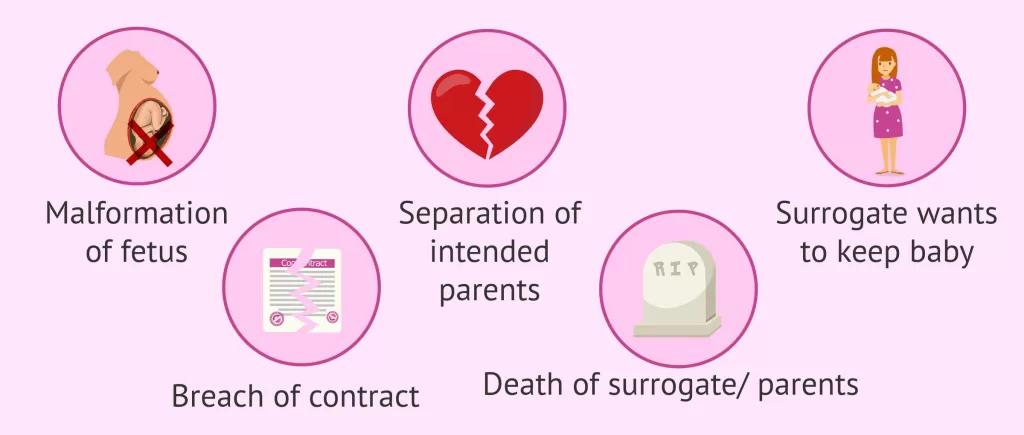Surrogacy health risks are becoming an increasingly important topic of discussion as more families turn to this option for parenthood. Recent studies have indicated that women acting as surrogates face significant health concerns, including a higher likelihood of serious complications such as preeclampsia. Notably, the data reveals that surrogates experience nearly four times the risk of life-threatening health issues compared to women who carry their own pregnancies. This raises urgent surrogacy safety concerns, especially in light of the economic disparities in surrogacy practices, where financial motivations can sometimes overshadow the well-being of the surrogate. As the number of surrogacy arrangements continues to rise, particularly among affluent families, it is crucial to examine the health implications involved for those taking this path.
The health implications associated with gestational carriers represent a critical area for potential parents looking into alternative family-building options. The increasing popularity of assisted reproductive techniques, often endorsed by high-profile figures, has highlighted several surrogate complications that may arise during the pregnancy process. A significant health study on surrogacy revealed troubling trends, such as substantial risks of conditions like preeclampsia, which can lead to lasting health issues for the carriers. Furthermore, the discussion extends beyond individual health concerns to address the broader social and economic landscape of surrogacy, emphasizing the ethical need for improved support and safety measures. By exploring these alternative terms and issues, we can better understand the complex environment surrounding surrogacy and its inherent challenges.
Understanding Surrogacy Health Risks
The health risks associated with surrogacy have recently garnered significant attention, particularly in light of new studies indicating that surrogates face drastically increased risks of complications during pregnancy. These findings are particularly troubling as they highlight a stark contrast between the experiences of surrogates and traditional mothers. For instance, a recent comprehensive study covering over 800,000 pregnancies in Canada concluded that surrogates are nearly four times more likely to encounter life-threatening complications, such as preeclampsia, during their pregnancies. This reality emphasizes the crucial need for further exploration and understanding of health risks specific to surrogacy arrangements.
Health risks such as preeclampsia can pose serious long-term complications for surrogates, including an increase in chances for heart disease and stroke later in life. This stark figure—an alarming increase from a 2% risk in standard childbirth to 8% in surrogate pregnancies—reinforces just how vulnerable surrogates can be. With the rise of celebrity endorsements of surrogacy as a family-building tool, it is imperative for potential parents and surrogates alike to be fully informed about these risks and to engage in informed discussions with healthcare professionals regarding their safety.
Frequently Asked Questions
What are the health risks associated with surrogacy for surrogates?
Surrogates face significant health risks, including a nearly fourfold increase in life-threatening complications compared to women giving birth to their own children. They are particularly susceptible to conditions such as preeclampsia, which can lead to long-term health issues including heart disease and stroke.
How common is preeclampsia among surrogates compared to standard childbirth?
Preeclampsia affects about 8% of surrogates, a stark contrast to only 2% of mothers undergoing standard childbirth. This alarming statistic highlights the heightened health risks surrogates face during pregnancy.
What surrogate complications should intended parents be aware of?
Intended parents should be aware that surrogates may encounter serious complications such as preeclampsia, gestational diabetes, and other pregnancy-related issues that significantly elevate health risks compared to traditional pregnancies.
Are there economic disparities in surrogacy that impact health risks?
Yes, economic disparities play a significant role in surrogacy. Surrogates often come from different economic backgrounds than the families they assist, which raises ethical concerns about the motivations for surrogacy and the uneven application of health screenings.
What factors contribute to surrogacy safety concerns?
Surrogacy safety concerns arise from various factors, including the increasing health risks highlighted in recent research, the stress of pregnancy on surrogates, and the potential inadequacies in health screening protocols prior to surrogacy arrangements.
What should potential surrogates know about health studies on surrogacy?
Potential surrogates should review health studies that detail the risks involved, such as the findings that indicate higher rates of severe complications like preeclampsia. These insights are crucial for understanding the personal health implications of becoming a surrogate.
Can surrogates experience lifelong health issues due to surrogacy?
Yes, surrogates may face lifelong health issues stemming from complications encountered during their pregnancies. The higher rates of serious conditions can lead to long-term challenges, necessitating informed decisions for women considering surrogacy.
What measures can be taken to improve surrogacy safety for women involved?
Improving surrogacy safety entails implementing stricter health regulations, ensuring uniform health screenings, and fostering awareness about the potential health risks associated with surrogacy, ultimately prioritizing the well-being of surrogates.
| Key Point | Details |
|---|---|
| Health Risks | Surrogates face nearly four times the risk of life-threatening complications compared to mothers who give birth to their own children. |
| Condition Prevalence | The occurrence of preeclampsia is higher in surrogates, affecting 8% of surrogate pregnancies versus only 2% among standard childbirths. |
| Motivations for Surrogacy | Many surrogates are motivated by financial incentives or a desire to help couples who cannot conceive. |
| Economic Disparities | Critics point out ethical concerns regarding the economic gap between surrogates and intended parents. |
| Regulatory Concerns | The need for improved health screenings and stricter regulations to protect the health and well-being of surrogates. |
Summary
Surrogacy health risks are a significant concern highlighted by recent studies, indicating that surrogates are at a substantially higher risk for life-threatening complications during pregnancy. As the popularity of surrogacy continues to rise, driven by both technological advancements and changing family structures, it is crucial for prospective parents and surrogates alike to be aware of these health implications. Comprehensive awareness and regulatory measures are essential to safeguard the health of surrogates and ensure ethical practices within this complex reproductive method.
The content provided on this blog (e.g., symptom descriptions, health tips, or general advice) is for informational purposes only and is not a substitute for professional medical advice, diagnosis, or treatment. Always seek the guidance of your physician or other qualified healthcare provider with any questions you may have regarding a medical condition. Never disregard professional medical advice or delay seeking it because of something you have read on this website. If you believe you may have a medical emergency, call your doctor or emergency services immediately. Reliance on any information provided by this blog is solely at your own risk.








